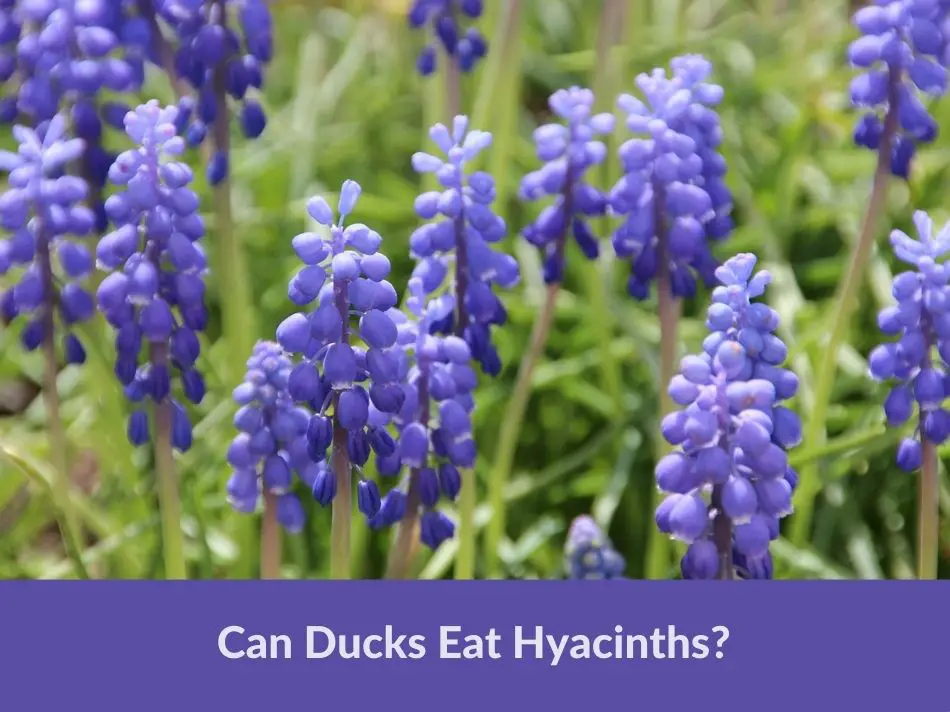Ducks are omnivorous birds that have a varied diet. In the wild, they feed on a mix of plants, seeds, nuts, fruits, and small insects, worms, and crustaceans. They’re also known to enjoy grains and greens. When it comes to domesticated ducks, their diet often includes duck feed pellets, vegetables and food scraps. But, can ducks eat Hyacinths?
No, ducks should not eat hyacinth. They contain oxalic acid and possibly other compounds that can cause poisoning if ingested. Symptoms of hyacinth poisoning can include vomiting, diarrhea, and even severe digestive disturbances.
In this concise article, readers can expect to learn about the dietary preferences of ducks, and the potential hazards of feeding ducks hyacinth.
What Are Hyacinths?
Hyacinthus is a genus within the Asparagaceae family, esteemed for its fragrant and vibrant bell-shaped flowers. Originating from the eastern Mediterranean, these perennial plants are a garden favorite, renowned for the striking splash of color they bring in early spring.
These plants are characterized by their bulbous nature, which enables them to survive and bloom annually. The flowers grow on dense spikes, with basal, sword-shaped leaves supporting the structure.
Hyacinthus bulbs are known for their ability to bloom indoors, a feature that has garnered them considerable attention from those seeking to enjoy their beauty year-round.
Hyacinthus has deep-rooted cultural associations, symbolizing peace and beauty, particularly in Greek mythology. In the realm of horticulture, their allure is not solely aesthetic; they are vital for attracting bees, thus playing a role in the pollination of numerous plant species.
Selective breeding has further diversified their appeal, leading to a multitude of cultivars with varied colors and forms.
Despite their ornamental value, it is the hyacinth’s potential toxicity that demands caution. The bulb contains the plant’s highest concentration of toxic compounds, making it hazardous if ingested by humans or animals, including ducks. This duality of beauty and risk underscores the necessity of informed cultivation and placement of hyacinths in shared environments.
Toxicity Concerns For Ducks
A fundamental consideration in assessing the suitability of any plant in the diet of ducks, or any animal, is the potential toxicity of the plant. Hyacinthus plants contain alkaloids, such as hyacinthine, as well as potentially toxic glycosides.
These compounds can be harmful if ingested in significant quantities. Symptoms of hyacinth toxicity in animals may include vomiting, diarrhea, and in severe cases, tremors, or convulsions.
For ducks, which may casually forage on a variety of plant materials, the risk of consuming toxic plants is not negligible. The digestive system of a duck is adapted to handle a variety of food items, but it is not equipped to detoxify the harmful compounds found in hyacinths.
They also contain oxalic acid, which also is toxic to ducks. Therefore, it is not advisable for ducks to eat hyacinths.
Nutritional Value Of Hyacinths
Beyond the immediate toxicity concerns, the nutritional content of a plant also determines its suitability for an animal’s diet. Ducks require a balanced diet that provides energy, proteins, vitamins, and minerals.
Hyacinth bulbs, while a source of starch, do not offer a complete or balanced nutritional profile for ducks. They lack the essential nutrients required for the health and well-being of these birds and should not be considered a viable food source.
Preventive Measures
For individuals who keep ducks as pets or manage habitats where both ducks and hyacinths are present, it is crucial to implement preventive measures. Physical barriers or selective planting can help in keeping ducks away from hyacinths.
Alternatively, educating ducks from a young age to recognize appropriate food sources can also be beneficial in reducing the likelihood of toxic plant ingestion.
Other Flowers Ducks Can Eat
While hyacinths are off the menu for ducks due to their toxic properties, there are a variety of other plants and flowers that can safely be included in their diet. In moderation and as part of a balanced diet, ducks can enjoy munching on several garden flowers.
Below are some tasty flowers that are safe for ducks to enjoy:
Remember to view our complete list of duck-friendly flowers and plants.
Conclusion
In conclusion, while ducks exhibit a broad diet, hyacinths are not a safe or suitable choice for their consumption. The potential for toxicity and the lack of nutritional value make hyacinths an unfavorable option.
Consequently, the coexistence of ducks and hyacinths requires careful planning and management to avoid any detrimental outcomes.
Disclaimer: The information in this article is for informational purposes only. I'm not an expert or a veterinarian.


